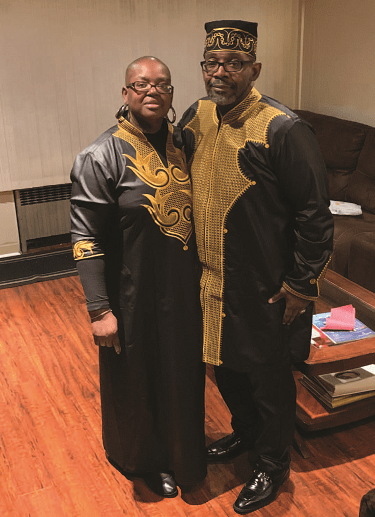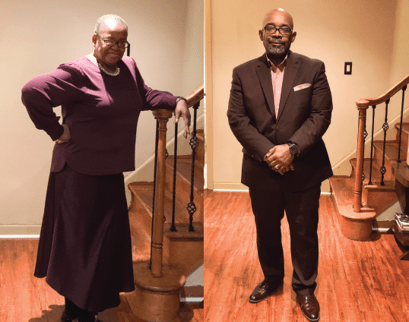A devoted couple went from fit to overweight to back to a healthy lifestyle with the help of weight loss surgery.

Charles and Diane Evans were high school athletes in northern New Jersey who first bonded over a shared love of sports.
Forty years—and 35 years of marriage—later, they have recommitted themselves to health and fitness. Both underwent bariatric surgery last year at the Surgical Weight Loss Program at Robert Wood Johnson University Hospital (RWJUH) Rahway.
They’re happy they did. “It’s changed how we feel about ourselves, how we look at ourselves, how others look at us—all for the better,” says Charles.
Building a Life
“Charles wrestled in high school and I was on the track team,” says Diane. “We didn’t date then, but a couple of years afterward we would run into each other occasionally when we both went back to the high school to help out with the teams.” The couple transferred to the same college to be together.
They married in 1986 and had their first child the day before their first anniversary. It wasn’t long before they were busy with demanding careers and three young children. “Life catches up with you,” says Diane, who was commuting into Manhattan for her job with the Army Corps of Engineers. (Charles is a supervisor of field operations for the New Jersey Department of Community Affairs.) “We were sports parents, taking carloads of our kids and their friends to their various activities and games but not being very active ourselves. There wasn’t really time to cook and eat at home, so we started getting a lot of fast food.”
They gained a lot of weight, and they tried various weight loss programs, fad diets, and over-the-counter remedies. “Our weight started yo-yo-ing up and down,” she continues. “We’d lose the weight and put it back on. ” Eventually, Charles reached 320 pounds, while Diane reached 268 pounds.
With the extra weight came health problems. “I developed high blood pressure and an enlarged heart from the additional weight,” says Charles. “I also had knee problems, which became worse because the weight put pressure on the joints.” Diane also developed high blood pressure and Type 2 diabetes as well. “And I had congenital arthritis, so extra weight was killing my joints, too,” she says.
The couple’s primary care provider suggested they consider bariatric surgery, which causes weight loss by restricting the amount of food the stomach can hold. “He said it would help us change our life,” says Charles. “Based on his advice, we set up an appointment.”

New Choices
Having bariatric surgery doesn’t mean you can forego healthy eating and regular exercise. A balanced diet and exercise are required to maintain weight loss post-surgery. Surgery, however, is a tool to help those healthy habits be even more effective.
“Like many patients, by the time Mr. and Mrs. Evans came to us, they were ready to make a positive change in their lives,” says Bariatric Program Coordinator Dianne Errichetti, RN. “They were tired of not feeling good, feeling fatigued, taking medications. It’s empowering for them to take the initiative for their long-term health.”
Charles and Diane had a full workup, meeting with a gastroenterologist and having an endoscopy, blood work, and psychiatric consult. They also had three visits with a nutritionist, where they talked about healthy eating and how to make good choices.
“We started eating better even before the surgery,” Charles says. “No more fast food, no more eating late in the evening. Diane wasn’t working in the city anymore, so that made things a lot easier. We also started walking on our own, as much as Diane’s arthritis would allow. The biggest thing was that we made a commitment to do this together.”
The couple was given information about the various kinds of bariatric surgery available. Both chose to have a gastric sleeve procedure, in which 70 percent of the stomach is removed. “People who undergo this type of surgery get adequate weight loss and help with existing health conditions, but they have normal digestion,” Errichetti explains.

Weight loss occurs not just because the stomach is smaller, but because of hormonal changes caused by the surgery. “In morbid obesity, there is a complex underplay of many hormones that are produced by the gut [intestines] and affect the brain and signal fullness after a meal,” explains Anish Nihalani, MD, Medical Director of the Surgical Weight Loss Program. “Metabolic surgery corrects an underlying hormonal discrepancy, which reduces appetite and cravings and promotes a feeling of satiety after eating.”
The Evanses had their surgery, performed by Dr. Nihalani, just over a week apart in April 2019.
Energy Returns
“Two months later, my weight was down to about 290, and I currently weigh 240,” says Charles. “I have a lot more energy and I can run around with my grandkids, which was one of the reasons I wanted to have the surgery.”
For Diane, the weight loss has been slower, but still impressive. “I’m down to 198, which isn’t yet where I want to be,” she says. “Dr. Nihalani says I should lose about 20 more pounds, so that’s what I’m working on now. I know the last little bit is always hard.”
The couple agrees that the surgery has changed their lives for the better. “It’s helped us not only lose weight but change our lifestyle,” Charles says. “Everything used to be centered around food. We used to live to eat, but now we eat to live.”
To learn more, Weight Loss and Bariatric Surgery at RWJUH Rahway, or call (732) 499-6300